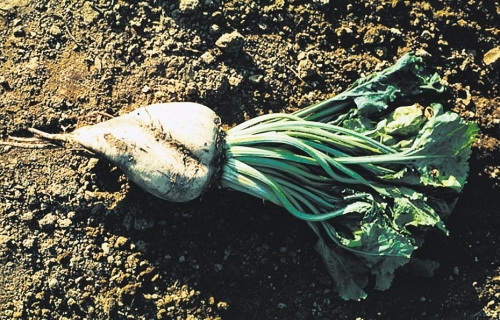Judge bans biotech beets

A federal judge has revoked the Agriculture Department's approval of genetically modified sugar beets until their effect on other plants is more thoroughly studied. The anti-GMO movement is hailing last Friday's ruling as a major victory for consumers and the environment.
Like the injunction that was placed on genetically engineered alfalfa by another California District judge, the government would have to complete an environmental impact statement before the planting of Monsanto's patented sugar beets – engineered to resist RoundUp herbicide – can resume. This process could take several years.
Biotech beets are grown on more than 1 million acres throughout ten states, including California, whose neighbor state to the north grows the majority of GMO sugar beet seeds.
In 2008, a consortium of organic farmers, organic seed growers, and environmental and consumer groups filed suit against Monsanto in federal court. Plaintiffs included the Organic Seed Alliance, the Center for Food Safety and the Sierra Club. All were concerned that windblown pollen from the genetically altered beets in Oregon’s Willamette Valley would contaminate conventional crops such as table beets and chard in adjoining fields. Their complaint included a 2001 European Union blankstudy which revealed that sugar beet pollen has been detected up to five miles from its source. The state of Oregon only requires a three mile buffer zone between GMO and non-GMO fields.
Organic farmers are especially worried about GMO gene “outcrossing” as the rules for organic labeling do not permit genetic modification. A growing body of research has also linked genetically modified foods to organ failure in lab animals. Andrew Kimbrell, the Center for Food Safety's executive director said in a statement, "Hopefully, the agency will learn that their mandate is to protect farmers, consumers and the environment and not the bottom line of corporations such as Monsanto."
A statement released Saturday by the Sugar Industry Biotech Council said that the sugar beet council intends to help the Department of Agriculture institute “interim measures” that would allow continued production of GM beet seeds while regulators carried out their environmental review.
Genetically modified sugar beets account for roughly one-half of the U.S. sugar supply, and biotech proponents claim there aren't enough heirloom seeds and herbicide to meet demand.
According to Judge White, the Agriculture Department "has already had more than sufficient time to take interim measures, but failed to act expediently." He explained in his 10-page decision that the department had almost a year to prepare for any market disruption. He overturned the deregulation of genetically modified beets last September.




